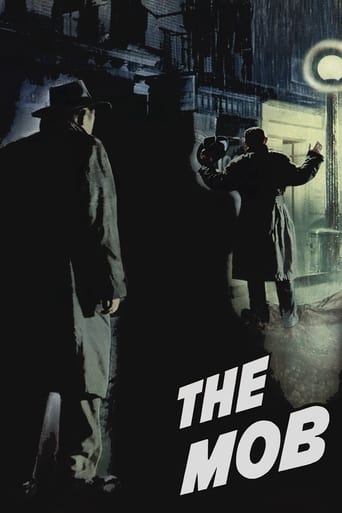tavm
The YouTube uploader seemed to want to fool some of us by ID'ing this movie as starring Broderick Crawford and Charles Bronson but Bronson only appears for a minute with only one line with no credit in this-one of his earliest film appearances. And he would have been credited as Charles Buchinski if he was billed. Anyway, Crawford is a cop who botched a police action setting in the beginning sequence so is assigned to infiltrate some crooked dealings at a dock to straighten things out. Besides Bronson, look also for early roles for Richard Kiley, Neville Brand, and Ernest Borgnine. I'll just now say The Mob was a nice surprise of a police drama from this period.
classicsoncall
If one didn't know better, it looks like this might have been a training film for future police detectives. How'd you like the way the cops planted a phony picture of Johnny Damico (Broderick Crawford) in the paper with a phony story to back it up? Or the wise guy banter Johnny used in his guise of Tim Flynn to ingratiate himself with big time gangsters? And what about rigging Smoothie's (Matt Crowley) car with the dripping liquid that glowed in the dark under a fluorescent lamp? Can you really do that? I thought it was pretty clever.I wasn't quite ready to give this movie credit as a film noir because there are really no sultry femme fatales to speak of, but in this case I don't think it matters. There are all kinds of shady characters prowling around with the likes of Ernest Borgnine, Neville Brand and Richard Kiley as part of the main event, and if you're sharp, you'll pick up on quick cameos by character actors Harry Lauter, Don Megowan and a still unknown Charles Bronson, a real treat for gangster film fans.The picture has it's share of neat twists, as in Richard Kiley's Clancy character turning out to be another undercover cop, and the dopey bartender Smoothie proving to be the mastermind criminal Blackie Clegg. Crawford makes the picture with his snappy dialog that's quick witted and off the cuff, and he's good with his fists when he has to be, and sometimes even when he doesn't. The ending comes off as a bit forced with the rooftop snipers waiting for bad guy Blackie, but the best has to be the way Clancy sets up Johnny for the closing scene. You'll just have to check it out for yourself.
LeonLouisRicci
When the Decade of the 1950's Kicked in, Film-Noir Purists are asked to Except the Conceit of New Wrinkles such as Upbeat Endings and Authorities (Police and Government) as the Saviours and Benevolent Overseers of Mankind. In this Underseen, Underrated, and Overlooked Entry Broderick Crawford Delivers some Stinging Zingers and is a Perfectly Cast Noir Hero that is a Burly, Brawling, Beefy, Mountainous Man that is Able to go Undercover to Ferret Out the Mob Boss and can Hold His Own Amongst the Equally Ugly and Street Level Gangsters and Longshoremen.After a Killer Opening Drenched in the Dark City Milieu of Encroaching Buildings and Shadowy Streets, Crawford's Police Superiors Order Him to Narc Up and Send Him into the Lion's Den. There is a Rogue's Gallery of Now Familiar Faces and a Blue Collar World of Corruption Filled with Fisticuffs, Frame-Ups, and Seedy Bars.The Dialog, Character Actors, Direction by Robert Parrish, and the Noir Photography with Gloomy and Dilapidated Sets, a Twist at the End, and an Overall Depressing Tone make this Fifties Film-Noir a Must See.
David (Handlinghandel)
Broderick Crawford plays a cop in this excellent crime drama. (I wouldn't call it a film noir but I'd say it got to the location of "On the Waterfront" first. And, in my very humble opinion, pulled together a better story.) The dialogue has a snappy edge that isn't found much in gangster movies of this period. The guys -- and it's mostly all guys here -- have a sarcastic way of communicating. They talk like athletes or construction workers. I've been both and I know. A lot of calling each other cheerleaders and other ways of joking about their masculinity. But it's done in a good-natured, blue collar. There is no hint of anti-gay sentiment.Broderick Crawford generally seems so different from his mother it's hard to imagine they were related in that way. But here we pick up his casually comic timing.Crawford is excellent as a policeman who goes undercover on the docks. Richard Kiley shines as one of the guys -- giving nothing away, here -- he deals with. And Matt Crowley is fine as another. (I checked on him and he played Walter Burns in a TV version of "The Front Page in 1945. Wow! I didn't know there WAS TV in 1945.) The actress playing Crawford's girlfriend isn't bad. She plays a nurse and she seems wholesome. Wholesome and dull. She seems to have few film credits.This has an authentic feel. And it's different, too. It's definitely a keeper.






